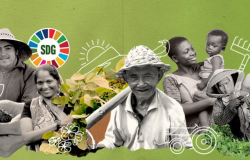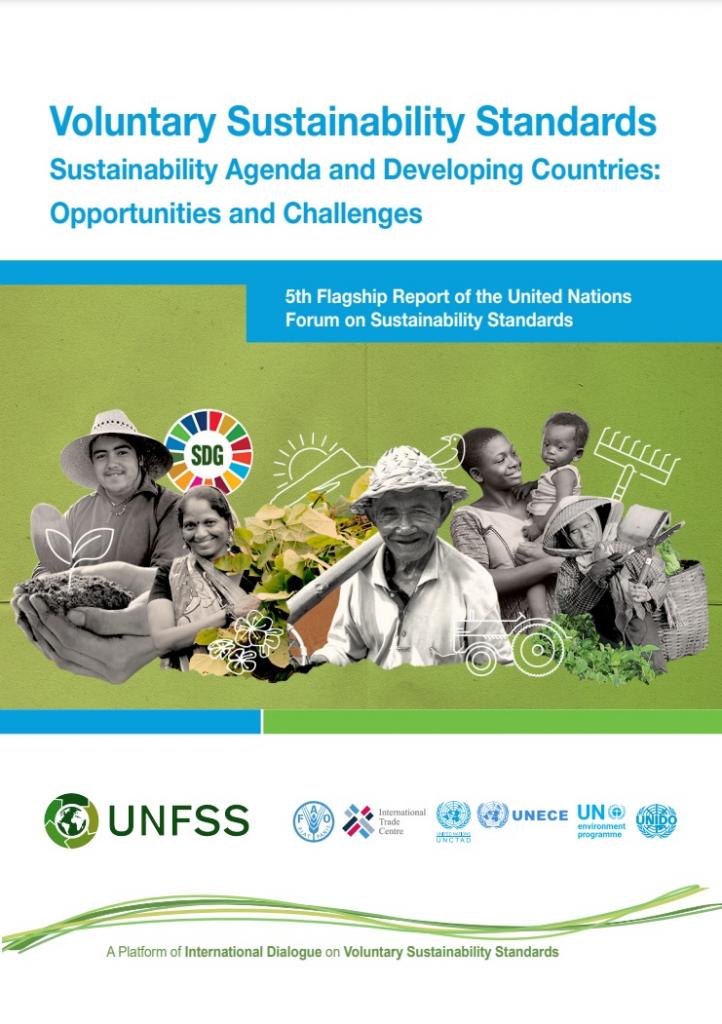United Nations report highlights the opportunities and challenges of Voluntary Sustainability Standards for Developing Countries

-
Voluntary Sustainability Standards (VSS) schemes have the ability to help smallholder farmers change their production and managerial practices through trainings, capacity building, price premia, as well as pre-financing and technical assistance.
-
Even though VSS can be a catalyst of trade through its potential to enhance competitiveness and reduce information cost, developing countries still face significant challenges to engage in certification.
-
The design of VSS varies significantly which can have an effect on their effectiveness.
-
Assisting local producers in developing countries to overcome cost barriers is key, through providing access to financial resources, cost-sharing arrangements, and transparency, as well as governing data for research and collaboration
According to the United Nations, the 17 Sustainable Development Goals (SDGs) are the blueprint to achieve a better and more sustainable future for all. They address the global challenges we face, including poverty, inequality, climate change, environmental degradation, peace and justice.
To achieve the SDGs and sustainable and inclusive growth, it is vital that sustainable business practices are adopted throughout the entire global value chains (GVCs). Companies are increasingly placing Voluntary Sustainability Standards (VSS) at the center of the sustainability approaches governing their GVCs. So much so that VSS have been proliferating over the past few decades. They have emerged as important tools to address sustainability challenges such as biodiversity loss, climate change, pollution and human rights violations.
 VSS are defined as “standards specifying requirements that producers, traders, manufacturers, retailers or service providers may be asked to meet, relating to a wide range of sustainability metrics, including respect for basic human rights, worker health and safety, the environmental impacts of production, community relations, land use planning, and others”. They apply the logic of certification whereby producers apply to receive a certificate if they comply with the standards. Conformity with the standards is assessed by independent third parties which award the certificate.
VSS are defined as “standards specifying requirements that producers, traders, manufacturers, retailers or service providers may be asked to meet, relating to a wide range of sustainability metrics, including respect for basic human rights, worker health and safety, the environmental impacts of production, community relations, land use planning, and others”. They apply the logic of certification whereby producers apply to receive a certificate if they comply with the standards. Conformity with the standards is assessed by independent third parties which award the certificate.
VSS has gained increasing importance as a governance tool. In 2022, there are 319 VSS in existence and 455 ecolabels, since it started to proliferate from the 1990s. By establishing standards for sustainable consumption and production practices, VSS can help achieve environmental, social and economic sustainability. It is expected that the implementation of VSS will contribute to mitigating environmental crises, and improving social and economic sustainability, fostering food security and improving livelihoods, as well as helping to improve the goals of job creation and poverty alleviation, among others. Compliance with VSS requirements could also increase market access and generate trade opportunities for producers in developing countries.
However, engaging with VSS can also represent challenges for developing countries as it can increase production and information costs, making it harder for developing countries to comply.
The 5th Flagship Report of the United Nations Forum on Sustainability Standards on “Voluntary Sustainability Standards (VSS), Sustainability Agenda, and Developing Countries: Opportunities and Challenges” finds that the use of VSS is widespread among countries with high levels of economic development and a strong regulatory framework. This however mostly includes developed countries. The report identifies several challenges for developing countries to fully engage with VSS. These challenges relate to the costs involved in obtaining certification, the lack of incentives to adopt VSS, socio-political resistance to VSS, the lack of inclusion of actor in developing countries in the governance structures, and the prevalence of governance gaps between developed and developing countries. The way forward would be to critically assist local producers to overcome cost barriers, provide access to financial resources, cost-sharing arrangements, and transparency, as well as governing data for research and collaboration.
Moreover, exploring ways to overcome these challenges more structurally the report zooms in on how VSS can be leveraged through interactions with public policies. In this context the report discusses the recent emergence of human rights due diligence (HRDD) regulations which constitutes an important development in public policy that can potentially impact VSS significantly. HRDD regulations require firms to govern their value chains in conformity with human rights criteria and can drive the adoption of VSS as management tools for value chain governance. More generally, governments are expected to play a key role in addressing sustainability concerns, and VSS are increasingly used to support government action.
The interaction between VSS and governments could lead to the latter supporting VSS or controlling VSS, or to VSS supporting governments. Each of these interactions would result in different forms of public private policy mixes. However, the integration of VSS into new public development policies have potentially challenging implications for developing countries that need to be better understood and addressed.
The report also discusses the impact of VSS on different sustainability dimensions and highlights that current literature is inconclusive on the results. This triggers a further debate on how to increase the effectiveness of VSS and focuses on incentives for compliance. Here the report identifies price premiums as an importance mechanism to foster compliance which can result in higher effectiveness.
Axel Marx is Deputy Director Leuven Centre for Global Governance Studies, KU Leuven. He is currently the co-chair of the Academic Advisory Council of the United Nations Forum on Sustainability Standards. His research interests include voluntary sustainability standards, sustainable development, human/labour rights and EU trade policy.
Santiago Fernandez de Cordoba is a Senior Economist at UNCTAD, Coordinator of the United Nations Forum on Sustainability Standards (UNFSS) and Visiting Professor in Universidad de Navarra’s Center for International Development. He has also served as trade expert for the World Bank, OECD and WTO.
Ruby Lambert is an Associate Economist at UNCTAD, and a secretariat advisor of the UN Forum on Sustainability Standards (UNFSS). She is specialized in sustainability standards and gender non-discriminatory provisions in international trade and value chains.
Charline Depoorter is a doctoral researcher at the Leuven Centre for Global Governance Studies and at the Division of Bioeconomics, KU Leuven. Her research focuses on governance of trade for sustainable development, more specifically on voluntary sustainability standards as private governance instruments for sustainable value chains.
[Read the 5th Flagship Report here]
Background to the report
The United Nations Forum on Sustainability Standards (UNFSS) is an initiative of six United Nations agencies – FAO, ITC, UNIDO, UNECE, UNEP and UNCTAD is the secretariat coordinating this initiative, established the Academic Advisory Council (AAC) in 2020. The AAC was designed to pursue the scientific objective of understanding the effectiveness of VSS and identifying the determinants of effectiveness.
In October 2022, the United Nations Forum on Sustainability Standards (UNFSS) together with the Leuven University’s Centre for Global Governance Studies and AAC launched the UNFSS 5th Flagship Report on “Voluntary Sustainability Standards (VSS), Sustainability Agenda, and Developing Countries: Opportunities and Challenges”


